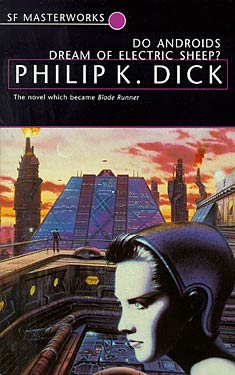Philip K.
Dick
Completed 9/16/2018,
Reviewed 9/17/2018
4 stars
There is so
much more to this book than the movie “Blade Runner”. Despite being a short book, there’s
interesting world building. There’s
television, religion, and an actual electric sheep. And of course, there’s chasing after
androids. The book is a fascinating look
into the creative powers of PKD. He
managed to pack into this small book a post-apocalyptic world with a decaying
ecosystem and nuclear fallout. I wish I
had this book in my science fiction class in college because it there’s so many
things that could be discussed in a group.
Being short, there seemed to be a couple of loose ends that weren’t
neatly tied up, but overall, the book had its intended effect on me.
Rick Deckard
is a bounty hunter, chasing after rogue androids. His latest assignment is to find and kill six
of the newest model androids that have returned illegally from Mars. He’s also enamored with live animals. In this future world, many of the earth’s
species are going or have gone extinct because of the radiation of the last
war, World War Terminus. It becomes
prestigious to own a live animal, rather than an electric one. Deckard has an electric sheep, but is always
going by the pet store, drooling at the outrageously expensive animals for
sale, like a thirty thousand dollar ostrich, or something more reasonable like
a goat with a five year payment plan.
This future
has its share of gadgets. There’s the
mood organ with which you dial one of hundreds of options to put you into that
mood, from ecstacy to severe depression.
There’s also the device (the name of which I can’t remember) that lets
you experience the martyrdom of Wilbur Mercer, the founder of the religion
Mercerism. Through it, you can share all
the joys and pains of all the other people connected to their device.
The
television of the future has only one channel and one program, a sort of Today Show/Tonight
Show that’s hosted by the comedian Buster Friendly. The show has guests and features weather
reports about the state of fallout and pronouncements on what’s real and what’s
fake.
All of these
things, the animals, the devices, the television, create an interesting future
of consumerism and mood-altering to help people who must stay on Earth. Many people have left the dying Earth for
Mars to avoid repercussions from the fallout.
Those that remain are workers like Deckard, and chickenheads, people
whose bodies or minds have been affected by the fallout. Staying on Earth is depressing business, so
people believe in Mercerism, use the mood organ, and spend all their money on
animals.
There’s
quite a complex morality play at the heart of Deckard and his business. He often questions his actions as a killer of
androids. Androids don’t have
empathy. The test he uses to determine
if someone is an android or not is a series of questions designed to determine
if the person in question has empathy.
At one point, he asks himself a few questions to determine if he is an
android, because he has lost empathy for the androids.
I give this
book four stars out of five. The basic
plot is exciting, but as you can probably tell, I really dug the animals, gadgets,
the religion, and the ambiguous morality.
I usually don’t notice plot holes, but there were a few. The book could easily have been longer to
deal with some of these loose ends. The
prose is not awesome, but it reads like most of the PKD books I’ve read so far,
terse being a good word for it. But also
like his other works, the prose style fits this noir-ish story. Despite having “Blade Runner” deep in my
psyche, I was able to experience the excellence of this book in its own right. I didn’t even have Harrison Ford as Deckard distracting
me.

No comments:
Post a Comment